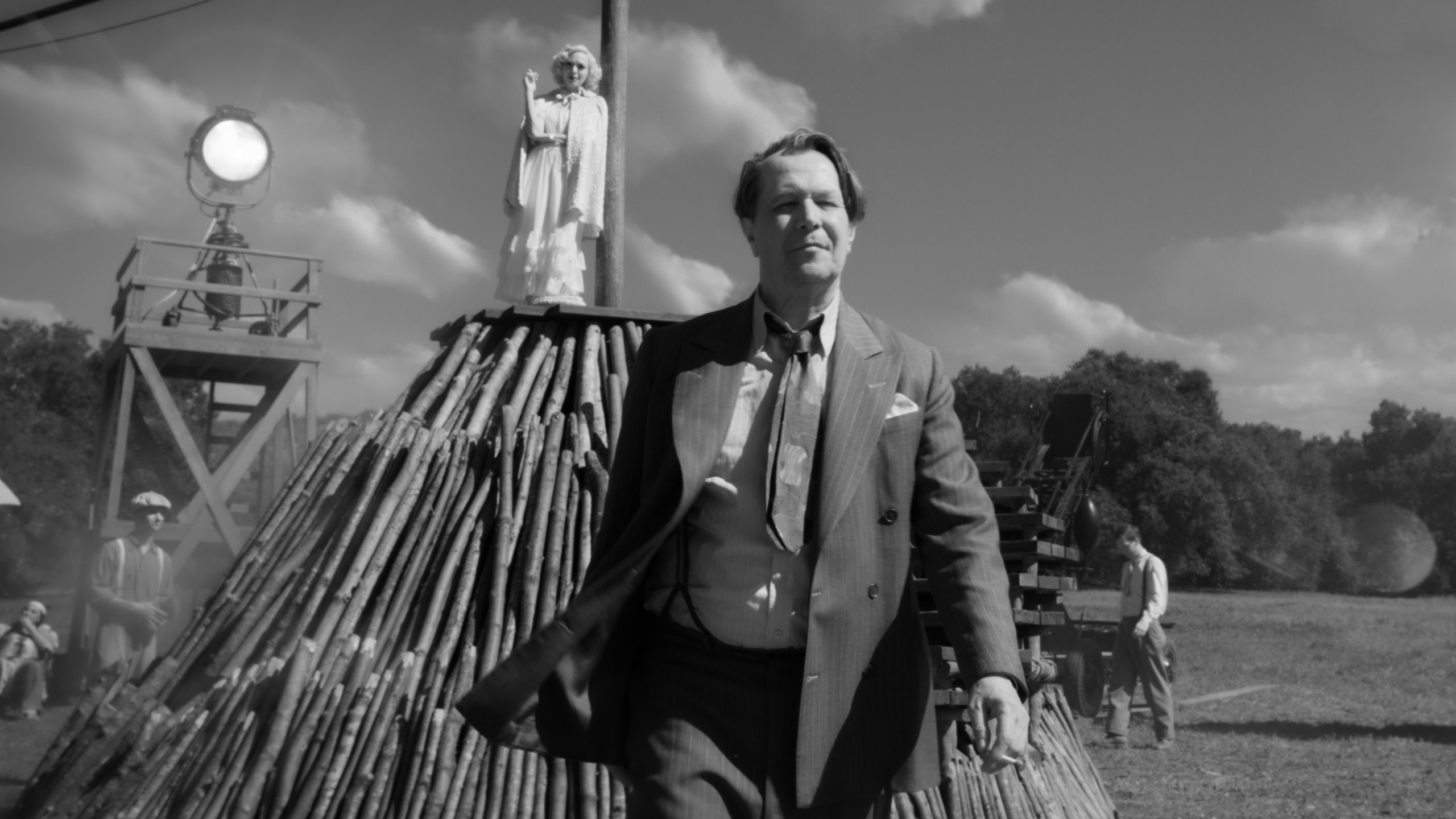Directed by David Fincher, and written by his late father Jack, Mank stars Gary Oldman as, well, Mank. Or correctly, writer Herman Mankiewicz, who is the credited co-writer of Citizen Kane. Mank looks at Herman’s life and personality before and during the writing of the 1940 classic, interweaving a watershed California election, and Mank’s relationships with Orson Welles (Tom Burke), Louis B. Mayer (Arliss Howard), the titanic William Randolph Hearst (Charles Dance), and Hearst’s lover Marion Davies (Amanda Seyfried).
For this review, I couldn’t make up some fluffy intro. It didn’t feel right. Just like this film, I’d like to cut right to it as soon as possible. Give the credits first and spend no time delivering the essential information.
I didn’t love Mank.
By all accounts, this should be my kind of film. A new David Fincher project focused on the insides of Hollywood, delivering the backstory of a classic film, black-and-white, mono sound mix, and a witty screenplay. Yet, all of these parts failed to come together to make up that satisfying whole I was hoping for.
David Fincher makes, for the most part, dark and cynical films about arrogant and cold people. His main characters are often self-destructive, ignorant, abusive or emotionally empty men struggling to maintain structure or understanding in a world spiralling out of control. Gary Oldman as Mank is an ultimate Fincher protagonist in how completely self-destructive he is, with his merciless consumption of alcohol that surprisingly doesn’t kill him. Oldman plays this kind of helpless alcoholic well, however, it is also a simple and straightforward portrayal of a drunk: slurred words, slow blinks, and stagnant movements. It may speak to a truth of Oldman’s past as an alcoholic, but regardless of the fidelity behind him, there’s little to differentiate this version of an alcoholic from the ones I’ve seen before. Otherwise, I did love most of the performances, particularly Arliss Howard’s tongue-in-cheek take on Louis B. Mayer.
Mank unfortunately struggles to feel like a movie made by someone with as distinctive a style as David Fincher. His trademark locked-on camera that clinically follows the featured character of a scene’s every move is still here, but is at odds with the Jack Fincher’s script. It’s is a straightforward piece of work, and Fincher’s own excellence at playing with complex thematic levels and conflicting motivations is dulled by this kind of story that fits with a made-for-TV style you can easily find on HBO or Showtime. Beyond the interweaving flashbacks, this is a by-the-numbers ABC plot that even ends with a freeze-frame ending and credits detailing where our characters ended up afterwards.
In a strange dash of irony, I feel like Jack Fincher’s script would belong better in the hands of a director like Steven Spielberg, someone who loves Citizen Kane more than perhaps any film. Spielberg would nail the desperation and loneliness that Mank forces on those who care about him. It wouldn’t be above or below the director to get into the darker nature of creativity relating to substance abuse or directly question what kind of collaborator Orson Welles was.
However, the only way that Jack Fincher’s script exists on film now is because of David Fincher. The father and son duo would talk about what they wanted to achieve with the film, particularly during Jack’s chemotherapy in 2002. Mank is the film David had been planning to make first before his film career ever started with Alien3. Regardless of the deeply personal nature to the making of this film, it lacks the necessary grandeur under Fincher’s direction. Even something as broadly emotional and simplistic as The Curious Case of Benjamin Button works with David Fincher at the helm because he is able to focus that story’s scope firmly on the characters, creating a darker and more depressing alternative to another Eric Roth script Forrest Gump.
Mank feels too inside-baseball for its subject of classic film. Cameos or references to 1930s films, stars, writers, directors, executives, or events from the time could be fully embraced by those who’ve studied and loved this subject for decades, leaving those out of the loop in the cold. It’s hard to shake the feeling that Mank was a film that Netflix only produced because they wanted David Fincher under an exclusive contract, in turn giving him free reign to do whatever he wanted.
From a writer’s standpoint, Jack Fincher’s script is full of wit, charm and full of the kind of dedicated research you can’t help but appreciate. It should have been made years ago some way, and is criminal that it hasn’t or that Fincher went unappreciated as a possible great screenwriter in his life. Mank also looks gorgeous thanks to Mindhunter cinematographer Erik Messerschmidt, and paired with the mono sound mix that is a fun detail purely for film fans to salivate over. Score wise, Trent Reznor and Atticus Ross’ work does a solid job setting itself totally apart from their previous output.
Still, I can’t bring myself to say that I loved it despite all the right pieces being there. That mono sound mix and black-and-white cinematography featuring the occasional “cigarette burn” to mark transitions or “film grain” over the image, all designed to look and feel like a film of the 1930s, feels wrong to me when this was just shot on large-format digital cameras. Those touches are rendered false on someone who knows what they’re looking at, only instead improving the brilliance of the recent Robert Eggers film The Lighthouse which did all of Mank’s fun retro filmmaking techniques far better.
If you’re interested in learning about an unappreciated screenwriter, as well as how political Hollywood has always been, and the real-world context of the characters from Citizen Kane, then do watch Mank. Just know that it has basis in the specious-at-best 1971 New Yorker “Raising Kane” article by Pauline Kael, something since widely criticised by film scholars and those who knew the production of Citizen Kane. Mank struggles to make up its mind as to what message it should fully communicate, settling for a mix of many that don’t leave much impact beyond how terrible alcoholism is. It can be witty, breezy and may scratch that ‘retro itch’ for film fans, but Mank just didn’t work for me.
Director: David Fincher
Cast: Gary Oldman, Amanda Seyfried, Charles Dance
Writer: Jack Fincher




